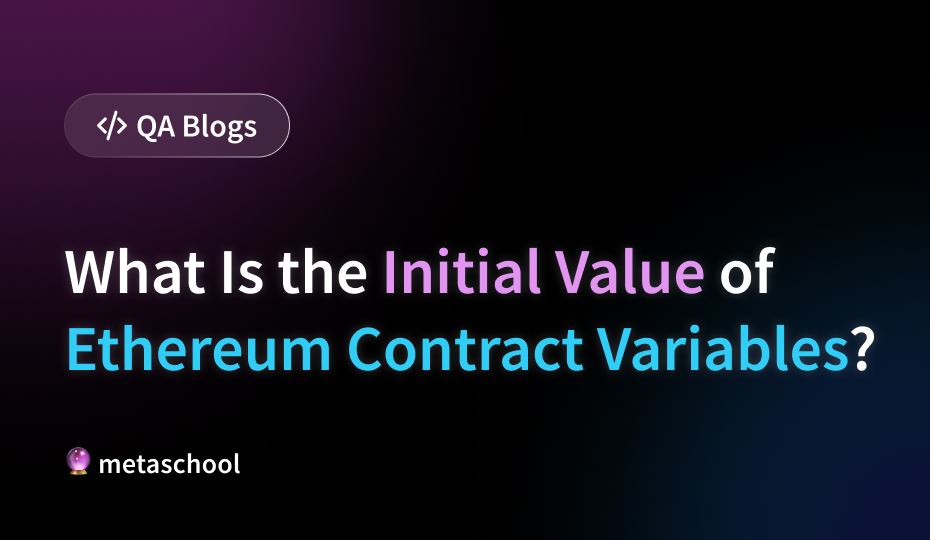Table of Contents
Understanding Ethereum contract variables
When it comes to Ethereum smart contracts, understanding how variables are initialized is fundamental. These variables define the state and behavior of the contract, and their initialization is crucial for the contract’s functionality and integrity. Let’s delve into the details of how Ethereum contract variables are initially set.
1. Contract structure and variables
In Ethereum, smart contracts are written in Solidity, a high-level programming language specifically designed for creating smart contracts. Contracts in Solidity consist of variables and functions, much like classes in object-oriented programming languages. These variables store data and define the state of the contract.
For example, consider a simple Solidity contract:
// SPDX-License-Identifier: MIT
pragma solidity ^0.8.0;
contract MyContract {
uint256 public myNumber;
address public myAddress;
string public myString;
constructor() {
myNumber = 10;
myAddress = msg.sender;
myString = "Hello, Ethereum!";
}
}In this contract, myNumber, myAddress, and myString are variables of types uint256, address, and string, respectively. These variables are initialized in the constructor function.
2. Constructor function
The constructor function is a special function in Solidity that is executed only once when the contract is deployed. It is used to initialize contract variables and perform any other one-time setup tasks.
In the example contract above, the constructor initializes the variables myNumber, myAddress, and myString with initial values. myNumber is set to 10, myAddress is set to the address of the contract deployer (msg.sender), and myString is set to "Hello, Ethereum!".
🔥 Check this course out: Build a One Piece Personality dApp With Solidity
3. Automatic initialization
Certain types of variables in Solidity are automatically initialized to default values if they are not explicitly initialized in the constructor. These default values are as follows:
- Integer types (
uint,int): Initialized to0. - Boolean type (
bool): Initialized tofalse. - Address type (
address): Initialized toaddress(0), which represents the null address. - String type (
string): Initialized to an empty string (""). - Mapping and array types: Initialized to empty mappings or arrays.
For example, in the following contract:
// SPDX-License-Identifier: MIT
pragma solidity ^0.8.0;
contract DefaultValuesContract {
uint256 public myNumber;
bool public myBool;
address public myAddress;
string public myString;
constructor() {
// No explicit initialization
}
}All variables myNumber, myBool, myAddress, and myString will be automatically initialized to their default values (0, false, address(0), and "", respectively) because they are not explicitly initialized in the constructor.
4. External initialization
In some cases, contract variables may be initialized externally through transactions or by calling specific functions after deployment. This allows for dynamic initialization based on external factors or user inputs.
For instance, consider a contract where a function is provided to update a variable after deployment:
// SPDX-License-Identifier: MIT
pragma solidity ^0.8.0;
contract ExternalInitializationContract {
uint256 public myNumber;
function initialize(uint256 _newValue) external {
myNumber = _newValue;
}
}In this contract, the initialize function can be called after deployment to set the value of myNumber to any desired integer value.
🔥 Check this course out: Build Hogwarts Sorting Hat dApp on Polygon
Conclusion
Understanding how Ethereum contract variables are initially set is crucial for developing and interacting with smart contracts effectively. Variables can be initialized in the constructor function, automatically initialized to default values, or initialized externally through transactions or function calls after deployment. By grasping these concepts, developers can design robust and functional smart contracts tailored to their specific use cases.
Remember, the initialization of contract variables sets the foundation for the contract’s behavior and functionality, so it’s essential to get it right from the start.
Try it out, ask us questions, and tell us how it went by tagging Metaschool on Social Media.
Follow us on –
🔮Twitter – https://twitter.com/0xmetaschool
🔗LinkedIn – https://www.linkedin.com/company/0xmetaschool/
